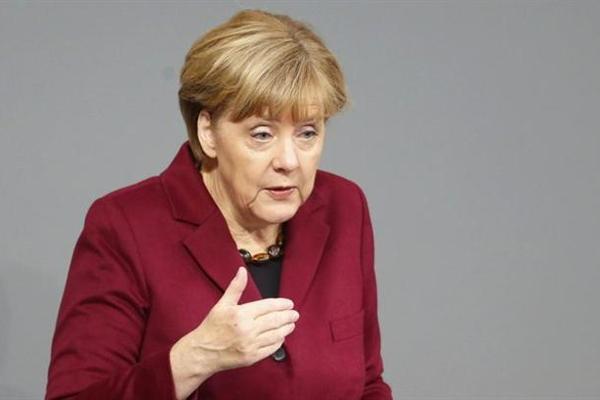Merkel says EU 'needs Turkey' to halt migrant tide
BRUSSELS - Agence France-Presse


REUTERS photo
EU leaders meet Oct. 15 to try to persuade Turkey to help stem the flow of refugees towards Europe, with German chancellor Angela Merkel saying it was "unacceptable" that the short sea crossing to Greece was being controlled by people smugglers."We cannot organise or stem the refugee movements without working with Turkey," Merkel declared just ahead of a summit in Brussels as she urged Europe to stand together in the face of its worst migrant crisis since World War II.
"Europe needs to show solidarity, anything else would be a failure," warned Merkel, who travels to Turkey this weekend.
As leaders gathered, the Greek coastguard said it had rescued more than 800 people in the Aegean Sea in the past 24 hours trying to cross from Turkey.
Meanwhile, Croatia said more than 4,800 migrants had entered the EU member state on Oct. 14, bringing the overall number of arrivals to nearly 175,000.
The Brussels summit will focus on securing Turkey's agreement to a plan to halt the flood of humanity seeking refuge from war and upheaval across the Middle East and North Africa, with almost 600,000 people arriving in Europe so far this year.
Leaders will discuss a possible safe zone that Turkey wants to establish on its border with war-torn Syria, where many EU countries suspect Ankara has its own agenda.
The situation is made more complicated by the fact Turkey -- which has itself taken in more than two million refugees -- is a long-standing EU candidate member but accession talks have stalled over its human rights record.
EU Vice-President Frans Timmermans and other senior officials arrived in Turkey on Oct. 14 to push the plan, having postponed their visit after deadly suicide attacks in Ankara at the weekend.
"An agreement with -- and concessions to -- Turkey only make sense if it effectively reduces the influx of migrants," European Council President Donald Tusk said as he prepared to host the summit.
European leaders hope that by helping Turkey cope with the refugees and tighten border controls, they can prevent more people risking their lives on the perilous journey to Europe.
For its part, Turkey, whose President Recep Tayyip Erdoğan was in Brussels last week, wants more cash and swifter moves towards visa free travel to Europe, but rejects proposals for more refugee camps.
Erdoğan also wants more EU cooperation for his fight against "terrorism", which targets both the outlawed Kurdistan Workers' Party (PKK) militants and Islamic State of Iraq and the Levant (ISIL) jihadists.
Tusk, who visited Turkey and Jordan last month, warned the issues are complex and defy easy solutions.
"Just to give one example. Turkey is calling on us to support... a safe zone in northern Syria whereas Russia -- increasingly engaged in Syria -- is openly rejecting this idea," he said in his summit invitation letter.
Turkey wants a safe area and no-fly zone in northern Syria free from both Bashar al-Assad's forces and ISIL, but EU countries are "sceptical" and wary, diplomats say, especially after Russia dramatically launched air and missile strikes to support its long-time ally.
"It's a real dilemma -- and the intervention of Russia and Iran makes the situation even more difficult," a European diplomat said.
EU leaders, mindful of the Ukraine conflict in the background, are set to warn that Moscow's military intervention will only add to the chaos amid concerns millions more people could be forced to flee if the war continues.
"The European Council expressed its concern about the Russian attacks on the Syrian opposition and civilians, and the risk of further military escalation," said draft summit conclusions obtained by AFP.
The draft conclusions add that there "cannot be a lasting peace" under the Assad regime, although they do not specifically state whether Assad himself can be part of a political transition.
In Syria meanwhile, Assad forces backed by fresh Russian air strikes launched a new offensive in the central province of Homs on Oct. 15.
With no end in sight to Syria's four-year war, the EU has been toughening its stance over the flow of migrants and refugees.
Arguments over relocating 160,000 refugees from the frontline states of Greece and Italy have given way to fears that Europe's passport-free Schengen zone could collapse as some countries try to curb the huge numbers of migrants criss-crossing the continent.
EU leaders will discuss a possible EU border guard system and other ways of strengthening the bloc's external borders, Tusk said.
They will also look at the future of the EU's Dublin asylum regulations, which say that refugees must seek asylum in the first EU country they land in.
The rule is being sorely tested as the majority of migrants head for Germany after first transiting Greece.
The EU leaders will also discuss so-called "hotspots" -- controversial reception centres where migrants are registered, fingerprinted and sorted into genuine refugees who will be granted asylum and economic migrants who must return home.
They will also discuss how to work with non-EU Balkan countries through which many migrants transit, and with the African countries of origin whose leaders they are due to meet at a migration summit in Malta in November.
